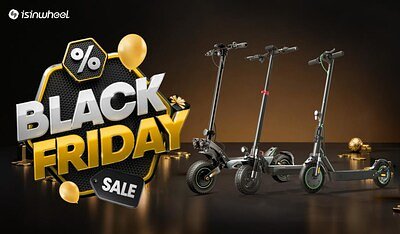
Eco-Wheels & Family Deals: Is Sustainable Mobility Driving the New Black Friday?
isinwheel's Black Friday push highlights a growing trend: families embracing electric scooters for sustainable transport. But is this genuine eco-consciousness, or just clever marketing?
Eco-Wheels & Family Deals: Is Sustainable Mobility Driving the New Black Friday?
Berlin, Germany – November 20, 2025 – As Black Friday looms, the traditional frenzy of consumerism is facing a challenge. A new wave of companies are attempting to align the notorious shopping event with sustainability goals, hoping to tap into a growing desire for eco-conscious choices. Electric scooter manufacturer isinwheel is leading this charge, offering discounts of up to 60% on its range of family-friendly scooters, and framing the sale as an opportunity to embrace sustainable family transport.
But is this a genuine shift in consumer values, or a calculated marketing maneuver? And what does it signify for the broader micromobility market?
Riding the Wave of Micromobility
The global e-scooter market is booming. Recent reports from Grand View Research estimate the market will reach $83.68 billion by 2030, driven by factors such as increasing urbanization, growing environmental concerns, and the desire for convenient, affordable transportation. Europe is a particularly strong market, benefitting from increased investment in cycling and micromobility infrastructure.
“We’re seeing a clear shift in how people think about transport, particularly in urban areas,” explains an industry analyst. “Commuters are looking for alternatives to cars and public transport that are both efficient and environmentally friendly. E-scooters offer a compelling solution, particularly for short-to-medium distance journeys.”
isinwheel’s Black Friday promotion features three models: the GT1 Off-Road Electric Scooter (£389, down from £599), the GT4 Dual Motor Electric Scooter (£799, originally £1,299), and the S4 Electric Scooter for Kids (£129, reduced from £169). The focus on family-friendly options suggests a deliberate attempt to appeal to a wider demographic.
Beyond the Discount: Is Sustainability a Core Value?
While the price reductions are undoubtedly attractive, the real question is whether isinwheel’s commitment to sustainability goes beyond marketing rhetoric. A deeper look reveals a company actively attempting to integrate eco-friendly practices into its operations.
“We are committed to reducing our carbon footprint throughout the entire lifecycle of our products,” states a company representative. “This includes sourcing sustainable materials, optimizing our manufacturing processes, and offering repair services to extend the lifespan of our scooters.”
However, achieving true sustainability within the consumer electronics industry remains a significant challenge. The sourcing of materials for batteries – particularly lithium and cobalt – raises ethical and environmental concerns. Furthermore, the lifespan of e-scooters can be relatively short, leading to e-waste issues.
“It’s important to be critical,” notes a sustainability advocate. “Discounts are great, but they shouldn’t distract from the bigger picture. Companies need to demonstrate a genuine commitment to circular economy principles – designing products for durability, repairability, and recyclability.”
Family Focus and the Shifting Commute
The appeal to families is a key element of isinwheel’s strategy. The S4 scooter for kids, in particular, speaks to a growing trend – parents seeking eco-friendly alternatives to car journeys for school runs and leisure activities.
“The school run is a major contributor to traffic congestion and air pollution,” says a parent interviewed in a local community forum. “An electric scooter offers a convenient and sustainable way to get my child to school, without adding to the problem.”
The rise of remote work and hybrid work models is also playing a role. As more people work from home, the need for short-distance transportation solutions is increasing. E-scooters are well-suited for these “last-mile” journeys – connecting commuters from their homes to public transport hubs or workplaces.
The Competitive Landscape and Future Trends
isinwheel isn’t alone in the e-scooter market. Established players like Segway and Xiaomi, as well as a host of smaller startups, are vying for market share. Competition is fierce, and companies are constantly innovating to differentiate themselves.
“We’re seeing a lot of innovation in battery technology, motor efficiency, and scooter design,” says the industry analyst. “Companies are also focusing on safety features, such as improved brakes, lights, and suspension systems.”
Looking ahead, several trends are likely to shape the future of the e-scooter market. These include:
- Subscription models: Offering scooters as a service, rather than a one-time purchase, could make them more accessible and affordable.
- Integration with smart cities: Connecting scooters to urban infrastructure – such as traffic management systems and charging networks – could improve their efficiency and usability.
- Focus on safety and regulation: Clearer regulations and safety standards are needed to ensure the responsible use of e-scooters and protect riders and pedestrians.
- Sustainable Materials & Circular Economy: A greater emphasis on designing scooters for longevity, repairability and recyclability.
A Small Step Towards a Greener Future?
isinwheel’s Black Friday promotion is more than just a sales event. It’s a signal that the e-scooter market is maturing and that companies are beginning to recognize the importance of sustainability. While challenges remain, the growing demand for eco-friendly transportation solutions suggests that electric scooters could play a significant role in creating a greener future. Whether this push is genuine, or merely a marketing tactic, the impact is a greater awareness of sustainable transportation choices.
